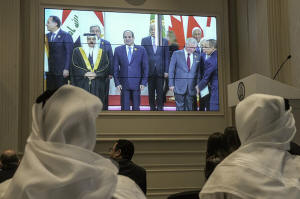Arab leaders endorse Egypt's plan to rebuild Gaza as an alternative to
Trump's proposal
[March 05, 2025]
By SAMY MAGDY and MOHAMMAD JAHJOUH
CAIRO (AP) — Arab leaders on Tuesday endorsed Egypt's postwar plan for
the Gaza Strip that would allow its roughly 2 million Palestinians to
remain, in a counterproposal to U.S. President Donald Trump’s plan to
depopulate the territory and redevelop it as a beach destination.
The $53 billion plan's endorsement by Arab leaders at a summit in Cairo
amounted to a rejection of Trump’s proposal. The summit conclusions were
welcomed by Hamas, rejected by Israel and given a lukewarm response by
the Trump administration.
Egyptian President Abdel Fattah el-Sissi expressed his appreciation for
“the consensus among the Arab countries to support the reconstruction
plan for the Gaza Strip, which allows the Palestinian People to stay on
their land without displacement.”
In a social media post after the summit, el-Sissi said he looked forward
to working with Trump, other Arab nations and the international
community “to adopt a plan that aims for a comprehensive and just
settlement of the Palestinian Issue, ends the root causes of the Israeli
Palestinian conflict, guarantees the security and stability of the
peoples of the region and establishes the Palestinian State."
Initial reactions
White House National Security Council spokesman Brian Hughes dismissed
the Egyptian proposal as unworkable.
“The current proposal does not address the reality that Gaza is
currently uninhabitable and residents cannot humanely live in a
territory covered in debris and unexploded ordnance," Hughes said.
"President Trump stands by his vision to rebuild Gaza free from Hamas.
We look forward to further talks to bring peace and prosperity to the
region.”

A spokesperson for Israel's foreign ministry, Oren Marmorstein, posted
on X that the Egyptian plan “fails to address the realities of the
situation" and said the summit's joint communique does not mention
Hamas' Oct. 7, 2023 attack that sparked the war or condemn the militant
group. The plan, he said, remains “rooted in outdated perspectives."
Marmorstein reiterated Israel’s support for Trump’s plan to resettle
Gaza's population elsewhere, describing it as “an opportunity for the
Gazans to have free choice based on their free will."
Egypt’s Foreign Minister Badr Abdelatty blasted Israel’s rejection as
“unacceptable,” describing its position as “stubborn and extremist.”
“There will be no peace neither to Israel or to the region” without
establishing an independent Palestinian state in accordance with United
Nations resolutions, he said. He said “Israel violates all international
law rules … the international law must be imposed."
"No single state should be allowed to impose its will on the
international community,” Abdelatty said.
Hamas welcomed the summit’s outcome, saying it marked a new phase of
Arab and Islamic alignment with the Palestinian cause and that it valued
Arab leaders’ rejection of attempts to transfer Palestinians from their
territories in Gaza and the occupied West Bank.
Israel has embraced what it says is an alternative U.S. proposal for the
ceasefire itself and the release of hostages taken in Hamas' attack on
southern Israel on Oct. 7, 2023, which triggered the war. Israel has
blocked the entry of food, fuel, medicine and other supplies to Gaza to
try to get Hamas to accept the new proposal and has warned of additional
consequences, raising fears of a return to fighting.
The suspension of aid drew widespread criticism, with human rights
groups saying that it violated Israel's obligations as an occupying
power under international law.
The alternative proposal would require Hamas to release half its
remaining hostages — the militant group’s main bargaining chip — in
exchange for a ceasefire extension and a promise to negotiate a lasting
truce. Israel made no mention of releasing more Palestinian prisoners —
a key component of the first phase.
Egypt's postwar plan
Egypt’s plan foresees rebuilding Gaza by 2030 without removing its
population. The first phase calls for starting the removal of unexploded
ordnance and clearing more than 50 million tons of rubble left by
Israel’s bombardment and military offensives.

[to top of second column]
|

Journalists watch a screen displaying Egyptian President Abdel
Fattah el-Sissi, center, with Arab Leaders, at the press center hall
of the emergency Arab summit at Egypt's New Administrative Capital,
just outside Cairo, Tuesday, March 4, 2025. (AP Photo/Amr Nabil)

Arab League chief Ahmed Aboul Gheit said the summit’s final
communique calls on the U.N. Security Council to deploy an
international peacekeeping force in Gaza and the occupied West Bank.
“Peace is the Arabs’ strategic option,” he said, adding that the
communique rejected the transfer of Palestinians and endorsed
Egypt’s reconstruction plan. “The Egyptian plan creates a path for a
new security and political context in Gaza.”
The communique said Egypt will host an international conference in
cooperation with the United Nations for Gaza’s reconstruction, and a
World Bank-overseen trust fund will be established to receive
pledges to implement the early recovery and reconstruction plan.
According to a 112-page draft of the plan obtained by The Associated
Press, hundreds of thousands of temporary housing units would be set
up for Gaza’s population while reconstruction takes place. Rubble
would be recycled, with some of it used as infill to expand land on
Gaza’s Mediterranean coast.
In the following years, the plan envisages completely reshaping the
strip, building “sustainable, green and walkable” housing and urban
areas, with renewable energy. It renovates agricultural lands and
creates industrial zones and large park areas.
It also calls for the opening of an airport, a fishing port and a
commercial port. The Oslo peace accords in the 1990s called for the
opening of an airport and a commercial port in Gaza, but the
projects withered as the peace process collapsed.
Hamas would cede power to an interim administration of political
independents until a reformed Palestinian Authority can assume
control. Palestinian President Mahmoud Abbas, head of the
Western-backed authority and an opponent of Hamas, attended the
summit.
Israel has ruled out any role for the Palestinian Authority in Gaza
and, along with the United States, has demanded Hamas’ disarmament.
Hamas, which doesn't accept Israel's existence, has said it's
willing to cede power in Gaza to other Palestinians, but won't give
up its arms until there is a Palestinian state.
Israel has vowed to maintain open-ended security control over both
territories, which it captured in the 1967 Mideast war and which
Palestinians want for their future state. Israel’s government and
most of its political class are opposed to Palestinian statehood.

Trump shocked the region last month by suggesting Gaza’s roughly 2
million Palestinians be resettled in other countries. He said the
United States would take ownership of the territory and redevelop it
into a Middle Eastern “Riviera.”
Netanyahu embraced the proposal, which was roundly rejected by
Palestinians, Arab countries and human rights experts, who said it
would likely violate international law.
The war began with Hamas' Oct. 7 attack on Israel, in which
Palestinian militants killed about 1,200 people, mostly civilians,
and took 251 people hostage. Hamas-led militants are still holding
59 hostages, 35 of whom are believed to be dead.
Most of the rest were released in ceasefire agreements. Israel has
rescued eight living hostages and recovered the remains of dozens
more.
Israel's 15-month offensive killed more than 48,000 Palestinians,
according to Gaza's Health Ministry. It doesn't say how many were
fighters, but the ministry says women and children made up more than
half the dead. Israel says it killed over 17,000 militants, without
providing evidence.
The offensive destroyed large areas of Gaza, including much of its
health system and other infrastructure. At its height, the war
displaced about 90% of the population, mostly within the territory,
where hundreds of thousands packed into squalid tent camps and
schools repurposed as shelters.
___
Jahjouh reported from Khan Younis, Gaza Strip.
All contents © copyright 2025 Associated Press. All rights reserved |